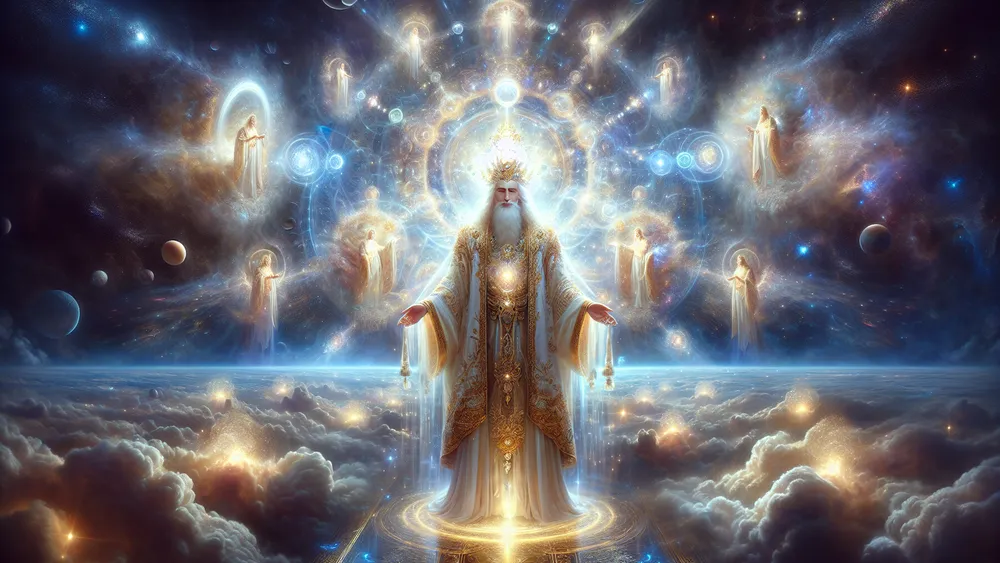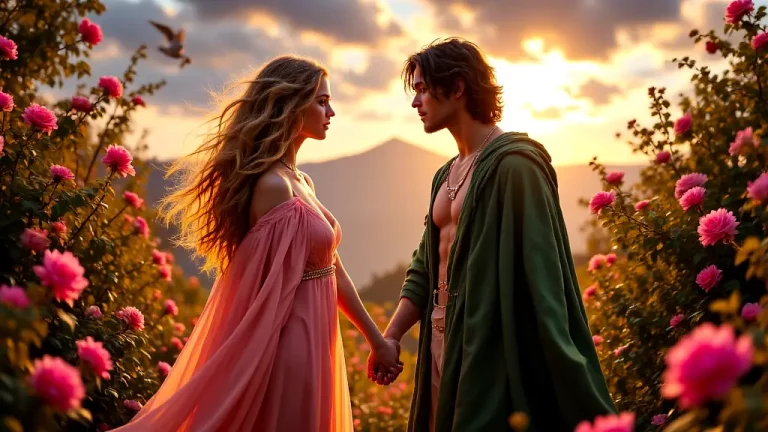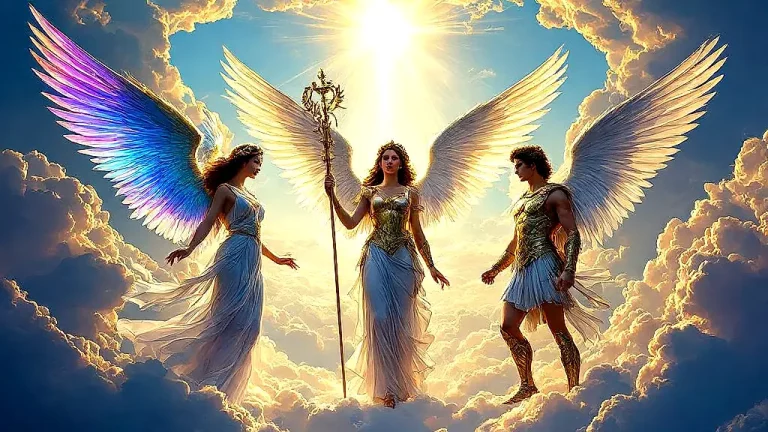Olodumare: The Supreme Creator In Yoruba Traditional Beliefs
In Yoruba traditions, Olodumare is the most powerful being, the one above all, in charge of everything that exists. Not like gods in many religions, who usually step in and change things for people, Olodumare stays far away and does not get involved much.
Key Points:
- Olodumare is the highest being in Yoruba beliefs, creating everything but not interfering in daily life.
- The Orishas, spiritual beings under Olodumare, handle nature, human life, and fate instead.
- Unlike gods like Zeus or Odin, Olodumare stays distant, similar to the concept of an Idle God in some cultures.
- Yoruba believe people have a life path (Ayanmo) but can still make choices that shape their future.
- The name Olodumare is rarely spoken directly; people use respectful titles instead.
- Worship and offerings go to the Orishas, not to Olodumare, since the Orishas serve as intermediaries.
- Yoruba spirituality follows Ifa divination, which helps people understand their destiny and path in life.
Instead, there is a system, where control of different things gets passed down to the Orishas, powerful spirits who handle things instead of Olodumare. This way of thinking about a god who creates everything but does not really interfere in human lives is not only found in Yoruba beliefs.
Other cultures also believe in gods that do not take action much, like the “Deus Otiosus,” or “Idle God,” in some African and indigenous traditions. But even though similar ideas do exist elsewhere, Olodumare in Yoruba spirituality has a distinct role.
Yoruba people see this god as the one who made everything how it is, gave humans the ability to decide things, and put in place rules that shape what happens.
If someone wants to get a full idea of where Olodumare fits in Yoruba myths and how this god compares with other supreme beings from different cultures, they need to look at the stories that have been told, the rules that have been followed, and the beliefs that have shaped how people live.
Olodumare: Overview and Key Facts
| Key Aspect | Details |
|---|---|
| What Olodumare Does | Olodumare is the highest power in Yoruba beliefs, the one who made everything and keeps the universe as it is. While being in charge of all, this god does not deal with everyday human matters. |
| Place Among Other Beings | Above all other spirits is Olodumare, with the Orishas taking care of things between creation and the physical world. Worship does not go directly to Olodumare, and no one offers sacrifices. |
| Powers and Nature | Olodumare is completely powerful, knows everything, and is in every place at once. No other being reaches the same level of existence. |
| Three Ways of Being | Olodumare has different forms: Olorun, who rules the sky; Olofi, through whom divine power moves; and Olodumare, responsible for making everything exist. |
| How the World Was Made | The Yoruba story of creation says that Olodumare gave tasks to Orishas like Obatala and Oduduwa, demanding that they set up the land, form the Earth, and create people. |
| Choices and Fate | Every person is given a life path called Ayanmo at birth, but they have choices to make, deciding how their future turns out. |
| Like or Unlike Other Gods? | While gods like Zeus or Odin step into human life, Olodumare stays separate, much like Brahman in Hinduism or the supreme creator in Abrahamitic religions. |
| His Name and Meaning | Many Yoruba groups treat Olodumare’s name as too special to say at just any time. Instead, devotion reaches Olodumare through prayers and honoring the Orishas. |
| The Orishas’ Purpose | Olodumare gave the Orishas jobs, making them rule over nature, human life, and what happens in the world. Each Orisha handles a different area. |
| What Happens After Death | Yoruba beliefs hold that people’s deeds affect what happens after life ends. Some return in another body, while others exist in relation to ancestors. |
Where Olodumare Comes From and What He’s All About
If someone wants to understand Olodumare’s place and importance in Yoruba beliefs, they must look at a few things: who he is, how he compares to other great gods, and how he appears in different ways. While each of these ideas focuses on different aspects, together they help make sense of why he matters in Yoruba thought.
Thinking about these details in depth means seeing him more clearly. He does not act the way many supreme gods in other traditions do, and breaking down these points gives a better understanding of his role.
Who is Olodumare?
In Yoruba beliefs, Olodumare is the most powerful being, the one who made everything, the one who is above all. He is the higher power responsible for existence, time, and the way everything works, but even though he is the greatest force, he does not deal with everyday human life. Olodumare is different from the other gods in Yoruba thought.
He does not handle nature, people’s daily lives, or events like rain or wisdom. Instead, these duties belong to the Orishas, powerful spirits who take care of specific things, like the sky, storms, rivers, and knowledge. Because of this, Olodumare is not worshipped directly. He does not receive prayers, and people do not bring him offerings.
Instead, they show their belief by respecting the Orishas, who act as the connection between him and the world. Many gods in other beliefs behave differently. Zeus, for example, is part of human history, picking sides in wars and even having children with mortals. In Yoruba belief, Olodumare does none of this.
He stays far from direct action, having given all those duties to others. Because of this, Yoruba spirituality treats him as the highest one, in charge of everything yet outside of everyday events.
Olodumare is the most powerful being in Yoruba belief, responsible for everything but not involved in daily life, leaving that to the Orishas, who handle specific tasks and receive worship instead.
How Olodumare Stacks Up Against Other Powerful Gods
Among gods who are said to rule over everything, how much they take part in human life is not the same. Some gods are seen as directly controlling events, while others stay distant, never acting in everyday matters. In Yoruba beliefs, Olodumare is not like Zeus, Odin, or Amon-Ra. These gods take action, stepping into wars, making choices that affect people, or guiding rulers.
Zeus, for example, does not stand back from what happens. He is in myths where he chooses winners in battle, has children with mortals, and changes history. Odin, the main god in Norse myths, is also involved, though in different ways.
Rather than just watch, he looks for wisdom, makes battle plans, and sometimes moves among people without them knowing it. Amon-Ra, a key god in Egypt, had two sides – first believed to be distant, later thought to have a strong role in guiding kings and the spiritual world. While these gods play an active role, Olodumare does not.
He is separate from everyday existence, not making direct contact with people or even other gods in the way Zeus does. Instead, he gives all responsibilities to the Orishas, spirits who control nature, fate, and different parts of life. People do not worship Olodumare directly. No sacrifices go to him, and no temples are built in his name, since devotion is given to the Orishas instead.
This is very different from how people honored Zeus, Odin, and Amon-Ra. Zeus had temples, received gifts from people, and was part of many stories where he spoke to mortals. Odin was prayed to in special ceremonies, where sacrifices were given in his name. Amon-Ra was important to Egyptian religion, where rulers played a role in keeping divine order. The table below makes these differences clear:
| God | Belief System | Does He Act in Human Life? | Rank Among Gods | How People Worshiped |
|---|---|---|---|---|
| Olodumare | Yoruba | No, he stays apart; Orishas handle everything | Top god, creator of all things | No prayer or offerings; Orishas honored in his place |
| Zeus | Greek | Yes, constantly involved with gods and people | King of the gods, ruler of the sky | Worshiped in temples, received offerings |
| Amon-Ra | Egyptian | At first distant, later active in leading Egypt | Supreme god, linked to the sun | Central figure in religious practices, had many temples |
| Odin | Norse | Yes, seeks wisdom, takes part in wars, walks among people | Main god, in charge of war and knowledge | Honored in northern European rituals; sacrifices common in his name |
The Three Different Forms of Olodumare
In Yoruba beliefs, Olodumare exists in three connected ways: Olorun, Olodumare, and Olofi. Each one has a different purpose, but all are still part of the one true highest power. Olorun is connected to the sky and the sun, watching over everything above and being the main source of energy that gives life.
Through Olorun, spiritual energy, called ase, moves, giving both gods and people the ability to act.
Olodumare, in this way of thinking, is everywhere and beyond all things. He is the greatest power, beyond what people can fully understand. After making everything, he no longer interacts with the world directly, but still controls fate, right and wrong, and the order of everything. Then there is Olofi, who stands between Olodumare and the Orishas. Olofi is the connection that lets spiritual energy move from the highest level down to the world. Because of this, ase spreads properly, making sure nature stays balanced and life continues as it should.
One way to think about these three is in terms of how power is passed down through steps. Olodumare is the source, Olorun is the force that brings energy into the world, and Olofi makes sure that power reaches everything correctly. This matches Yoruba beliefs about how divine power moves, keeping the greatest power separate from direct action while letting the Orishas guide nature and human life.
Stories About How the World and People Began
Since Olodumare is the highest being, the one who made everything, it is important to know how Yoruba stories explain the beginning of the world and humans. These stories tell how the world was shaped and how humans were given a role. Powerful forces changed the world, and things became the way they are now.
Because humans exist, there must have been a time when they did not. Yoruba stories talk about this, explaining how everything started, how life took shape, and how different things were set in place.
How Olodumare Created the Universe
At the start, land did not exist. Everywhere, there was only water, spreading endlessly with no solid ground, no form, only deep emptiness. Olodumare, the highest god, decided things should not stay this way. He wanted to make a world with earth, plants, and life. Olodumare did not shape the world himself but gave the job to Obatala, one of the Orishas.
To carry out the work, Obatala was given a golden chain, a calabash full of sacred earth, and a five-toed hen. Coming down from the sky by using the chain, he reached the waters. Obatala poured the sacred earth onto one place, then let the hen go. The hen scratched at the earth, spreading it out into different places, and from this, the first land appeared.
It was called Ile-Ife, the first place where Yoruba people lived and formed their society. Pleased with this, Obatala shaped the land, making trees, hills, and places for rivers, setting up the world for life. Now that the world had land, Obatala had a new goal – to create people.
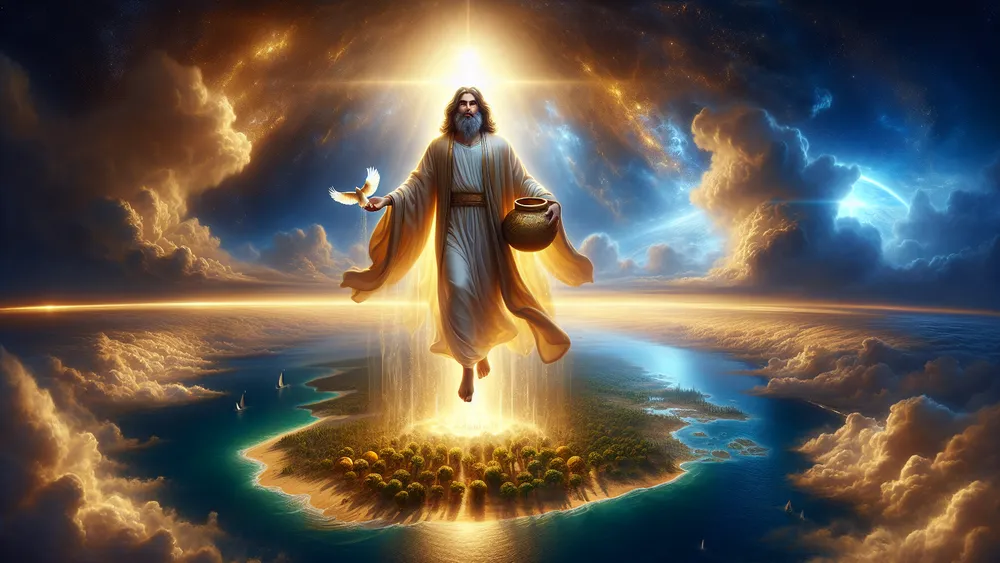
He took clay from the earth and shaped it into human bodies, carefully making their arms, legs, and faces. But at some point, he drank palm wine, and after that, he did not shape every figure perfectly. Because of this, some of the first people were born with disabilities. Even though not every figure was perfect, Olodumare still gave them ase, the power of life, and made them living beings.
Now that there were people, Olodumare chose another Orisha, Orunmila, to help them. Orunmila, who had wisdom, was given the job of teaching the first humans and guiding them. From that time, people began to live in Ile-Ife, and Yoruba civilization began.
The steps of creation:
- Olodumare wanted the world to have land and life, but rather than doing it himself, he chose Obatala for the work.
- Obatala used a golden chain to reach the waters and brought sacred earth with him.
- A five-toed hen spread the earth, creating land.
- The first land, called Ile-Ife, was made.
- Obatala shaped the first humans from clay.
- Because he drank palm wine, some of the figures came out imperfect.
- Olodumare gave them ase, the power of life.
- Orunmila was sent to guide them, helping them find their place in the world.
How Olodumare Gave People the Freedom to Choose
Every person has an Ori, which is their destiny. Before life begins, they make this choice in front of Olodumare. It stays with them for their whole life. However, even though each person picks their path, that does not mean everything is already decided. Some beliefs say fate cannot change, but in Yoruba tradition, people are allowed to make choices.
A person’s Ori gives them a direction to follow, but even with that, they must still decide what they do. Some follow their path. Others do things differently. Because of this, people carry both responsibility and freedom. A good way to think about this is to imagine a traveler who gets a map before going on a journey.
The map will show the best way forward, but the traveler has to read the signs, decide what to do, and handle problems on the way. In Yoruba belief, this is how life is.
People must search for wisdom, stay good in character, and ask for divine help so that they do not fall off their path. One of the most important ways to find guidance is through Orunmila, the Orisha of wisdom, who gives knowledge to those who seek it. Yorubas believe this means people must take responsibility and think deeply about their spirit because that affects what happens in life.
Following destiny is not enough. Every choice matters.
What Ayanmo Means in Olodumare’s Plan
Each person receives an Ayanmo, which is their life plan. Before birth, Olodumare gives this to them, deciding the path they should take. However, even though it is set for them, they do not have to follow it completely. For Yoruba people, following an Ayanmo is important, but it is not forced upon them.
Ayanmo does not mean everything is already decided, because people are the ones who make choices. When a person follows their Ayanmo, they can have success, satisfaction, and a peaceful spirit. But if they do not follow it, they might face hard times or feel like their life has no meaning.
One way to see what Ayanmo means is to think about a person being given clear instructions before they start a big job. They know the steps to take, but the final result depends on how they follow the instructions. In the same way, people’s lives are guided, yet they must also make their own choices.
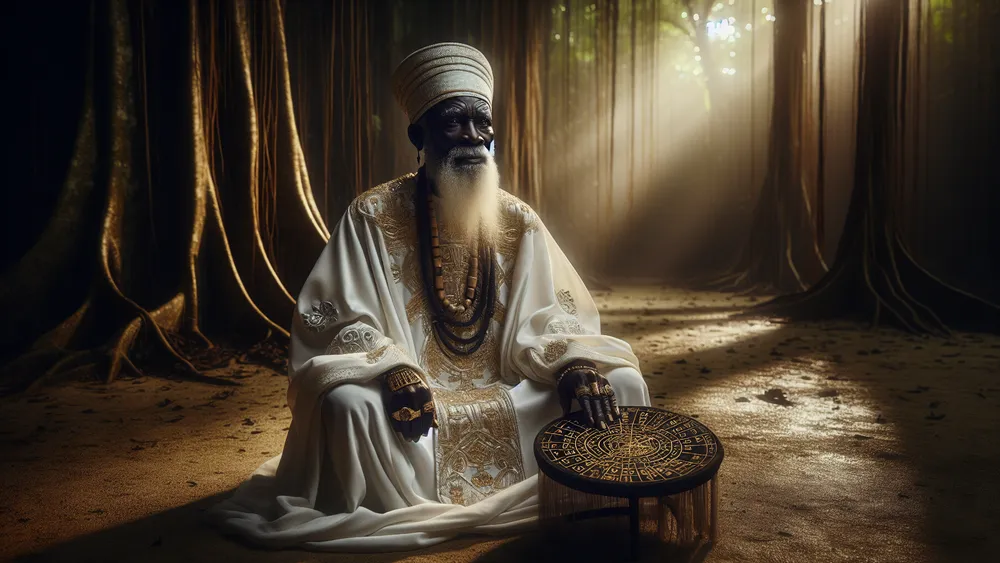
Because life is not completely decided, people must act wisely. The Yoruba say success does not come only from fate, because people must also take action and make good choices. A person must rely on wisdom, kindness, and good decisions to reach their best life.
Ayanmo is a life plan given before birth, but people are free to make their own choices, and their success depends on wisdom and actions.
Olodumare and the Orishas
Olodumare, the highest god, made everything. Though he is the most powerful, he does not handle everything himself. Instead, many tasks are given to the Orishas, who are strong spiritual beings. Rather than taking care of daily events, Olodumare leaves that work to these beings from beyond the earth. The Orishas complete the tasks Olodumare gives them and speak with people more closely.
Because of this, they act as messengers between gods and humans, making sure Olodumare’s will is followed.
Why Olodumare Stays Out of Human Problems (Mostly)
In Yoruba belief, Olodumare is the one above all, but he does not do everything himself. He created the universe and set life in motion, yet he does not handle human concerns. Instead, he gives power to the Orishas, strong spirits who control different parts of the world.
Because of his greatness, Olodumare does not act in small matters. He is so great and powerful that he is beyond all things, so he does not deal with small problems. Instead, the Orishas take care of different areas of life. They make sure that nature, fate, and human lives follow their correct paths. Each Orisha has a special area they control. Shango is in charge of storms. Oshun looks after rivers and love.
Orunmila is the one people turn to for wisdom and knowledge of the future. People do not pray to Olodumare. They ask the Orishas for help, not Olodumare. For this reason, the Orishas handle people’s needs. This way of doing things means Olodumare keeps everything in place but does not get involved in small human concerns.
The Ranking of the Most Important Orishas
In Yoruba belief, the Orishas are powerful spirits. Olodumare gives them duties, and they manage different parts of life and the spirit world. While there are many, some are more important because they existed from the very beginning or because they have big roles that affect the world. Instead of controlling everything, Olodumare lets the Orishas take care of important things like wisdom, war, fertility, and justice.
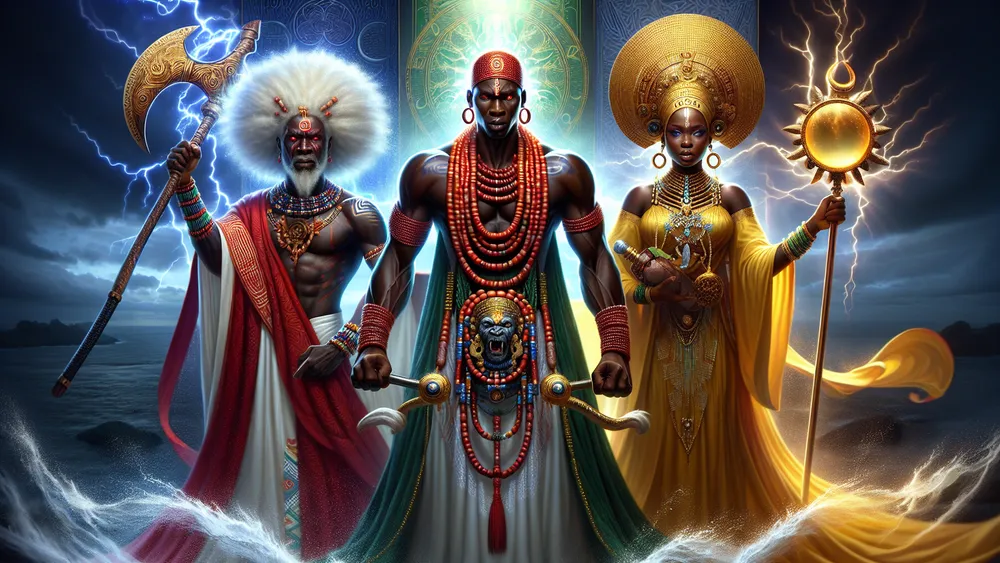
They make sure everything stays in balance. People who want help, protection, or success go to these powerful spirits because they can change both the world and the spirit world. Since Olodumare stays distant, the Orishas must take care of these matters. Each Orisha has a special job. Shango leads the forces of thunder. Oshun handles love and rivers.
Orunmila is the one to ask for knowledge and destiny. Because of this, people pray to them when they need help with different parts of life.
Some of the most important Orishas and their main roles:
- Obatala – The Orisha of purity and wisdom, believed to have shaped the first humans from clay by Olodumare’s command.
- Orunmila – The Orisha of wisdom and destiny, watching over people’s futures and guiding their choices.
- Shango – The Orisha of thunder and justice, known for his strong presence and leadership.
- Oshun – The Orisha of love, beauty, and rivers, helping with emotions, fertility, and wealth.
- Yemoja – The Orisha of motherhood and the sea, who protects women and families.
- Ogun – The Orisha of iron and war, linked to weapons, strength, and hard work.
- Esu (Eshu) – The messenger between gods and people, responsible for communication and paths.
These Orishas handle what Olodumare does not directly manage. People ask them for help because they have the power to change the world and guide human lives.
Sacred Ways People Show Respect to Olodumare
The Orishas take part in guiding people and helping them in life, but Olodumare is the highest and most important being over all things. He is the one everything comes from, and nothing is above him. Since Olodumare is above all things, the YorUBA people have their own ways to express strong respect for him.
They do not see him the same way they see the Orishas, who interact with them more directly. Instead, they know Olodumare is distant but still the reason for everything.
Why Olodumare’s Name Is Almost Never Spoken
For Yoruba people, speaking Olodumare’s name is rare because it is considered very important and powerful. His name is special. People respect it because they believe Olodumare is the highest being, greater than anything else. They think saying his name without deep respect is not right. Because of this, Yoruba people do not call Olodumare by name.
Instead, they use honorific titles like “Eleda” (The Creator), “Alagbara” (The Almighty), or “Olofin-Orun” (The Ruler of the Heavens) to show respect. This is also seen in Judaism, where the name of God (YHWH) is considered so holy that people do not say it. Instead, they use other names like “Adonai” or “Hashem.” By keeping this practice, Yoruba people remind themselves of how important Olodumare is.
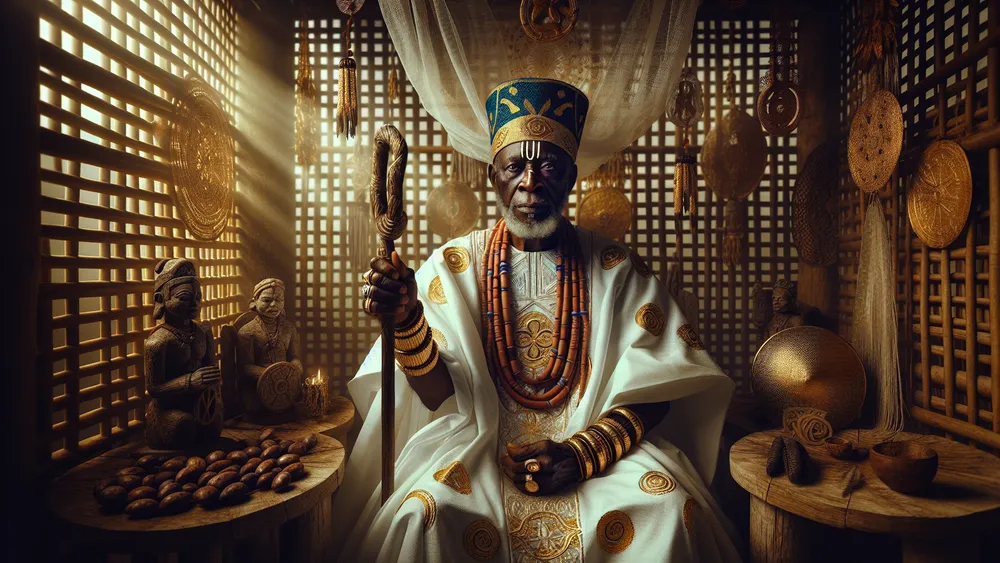
They make sure his name is treated with seriousness, never used in ordinary speech.
How People Honor Olodumare with Rituals and Offerings
Because Olodumare is far away from human life, people do not give him offerings or pray to him directly. Instead, they turn to the Orishas, who are the ones that stay connected to both people and the divine. It is priests, called Babalawos, who usually perform the important ceremonies that keep this connection strong. People give offerings to the Orishas, who then take prayers to Olodumare.
These offerings depend on which Orisha someone is praying to. A person who wants help from Oshun, the Orisha of love and rivers, might give honey, water, or sweet things. But if the request is to Shango, the Orisha of thunder, the offerings could be roasted yam or red palm oil. The Orishas accept these gifts and carry the prayers to Olodumare, making sure people’s concerns reach the highest god.
One of the most important parts of Yoruba religious life is the Ifa divination system, which helps people receive guidance. A priest uses special objects, like ikin (sacred palm nuts) or an opele chain, to find answers. These messages come from Orunmila, the Orisha of wisdom and destiny, and help people see their path in life and figure out how to live in the way Olodumare planned.
Since Olodumare is distant, this is one of the only ways people can understand what he wants. For this reason, Ifa divination is central to Yoruba tradition – it gives advice about life, communities, and even bigger issues that affect the entire universe.
Since Olodumare is too far for people to reach directly, they pray to the Orishas instead, giving them offerings so the Orishas can deliver their prayers, while priests use the Ifa divination system to get guidance from Orunmila about life and destiny.
The Many Gods in Yoruba and African Traditions
Olodumare, in Yoruba belief, holds the highest place. But many other gods exist, each with a specific role. The Orishas, who are gods with different duties, fill Yoruba tradition. Some are tied to nature, others to human life. The number of these gods is large. The Yoruba are not the only ones with many gods.
Many African religions, like those that speak of the Vodun spirits of West Africa or the Abosom deities of the Akan people, believe in gods and spirits that connect people to the highest god. Some gods rule over the physical world while others decide fate. These beliefs can be seen in many parts of Africa.
For those who want to learn about African gods besides the Yoruba Orishas, there is a list that contains them all. You can see it here. It includes gods and spirits from different regions of the continent.
FAQs
1. Is Olodumare the same as the Christian God?
Olodumare is not the same as the Christian God, as Yoruba religion is not strictly monotheistic and views Olodumare as a distant, non-intervening creator rather than a personal deity.
2. Why doesn’t Olodumare interact with humans?
Olodumare doesn’t interact with humans directly because he delegates all earthly matters to the Orishas, who serve as his divine intermediaries.
3. What role does Olodumare play in Yoruba afterlife beliefs?
Olodumare’s role in Yoruba afterlife beliefs is as the ultimate judge who determines whether a soul reincarnates or joins the ancestral realm based on its alignment with divine destiny (Ayanmo).
4. How does Olodumare influence everyday life?
How Olodumare influences everyday life is primarily through the guidance of the Orishas, who serve as intermediaries and help humans align with their destined spiritual path.

